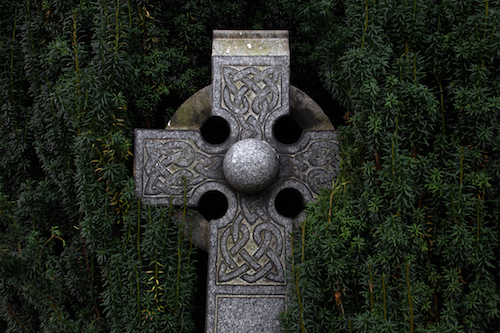We run our website the way we wished the whole internet worked: we provide high quality original content with no ads. We are funded solely by your direct support. Please consider supporting this project.

God’s Moral Immutability
Classical theologians from the fourth and fifth centuries on were very concerned with protecting their understanding of the metaphysical attributes of God—like timelessness, immutability, impassibility—by assessing biblical portraits that conflicted with these attributes to be accommodations. However, once we resolve that all our thinking about God must be anchored in the cross, our primary concern shifts from God’s metaphysical attributes to God’s moral attributes. While the revelation of God in the crucified Christ has implications for our understanding of God’s metaphysical attributes, it is first and foremost the supreme revelation of God’s character.
In fact, the biblical witness reflects far more interest in, and much more concern with, the moral character of God than it does with God’s metaphysical attributes. For while metaphysical attributes are in focus when one is reasoning toward a conception of God that can serve as a philosophical explanation the world, God’s moral character is the primary focus when peoples’ life and faith hang upon trusting God’s faithfulness, as was the case for the ancient Hebrews and earliest Christians.
This is apparent in the New Testament. Because NT authors were intensely focused on God’s revelatory action in Christ, Larry Hurtado argues, “statements about ‘God’ in the NT” are mostly about his “relational and moral attributes.”[1] And when we interpret Scripture in light of this “dynamic view of ‘God’” rather than through “the more static categories of the philosophically influenced theology of later centuries,” Hurtado argues that it significantly impacts how we understand all of Scripture’s language about God. For example, the classical theological tradition interpreted passages that speak of God’s unchanging nature in metaphysical terms—i.e., God never experiences any change. By contrast, Hurtado argues, the moral and relational focus of the NT’s cross-centered perspective suggests we should rather interpret these passages as referring to God’s “moral immutability, i.e., divine trustworthiness.”[2]
Therefore, if we allow the revelation of Jesus to inform our reasoning about the nature of God, we arrive at a conception of God as a personal agent who is unchanging in all the ways in which it is virtuous to be unchanging (e.g., in possessing a perfectly loving character and an unthreatened existence), but who is also contingent and changing in all ways in which it is virtuous to be contingent and changing (e.g., in being capable of being affected by, and responsively interacting with, contingent agents).
And, this happens to reflect the sort of immutability Scripture attributes to God as well as the sort of contingent activity Scripture ascribes to God.
If our reasoning about God is informed by revelation such that we conceived of God in personal loving terms, it would never occur to us to imagine that a being who is altogether necessary, timeless, immutable, impassible, and devoid of potentiality was superior to a being who possesses an unchanging character but who nevertheless experiences sequences, who is capable of changing in some respects, who experiences emotions, who is open to being impacted by others, and who has the potential to do new things and to have new experiences. To the contrary, we deem the degree to which a person possesses these latter qualities to be a measure of the depth of their personhood, and to the degree to which a person lacks these qualities we deem them impersonal and defective. Indeed, it is challenging to see how an agent who was completely devoid of these qualities would qualify as a “person” at all.
Hence, while we must certainly think of God as being necessarily unchanging in all the ways in which it is virtuous for a person to be unchanging, we must also conceive of God as being supremely open to change, supremely open to being impacted by others, and supremely open to doing new things and having new experiences when it is loving to do so.
[1] L. Hurado, God in New Testament Theology (Nashville: Abingdom, 2010), 35-7.
[2] Hurtado, ibid., 112-3. See n.79 above and n.123 below.
Photo credit: Adrian Moran via Unsplash
Category: General
Tags: Classical Theism, Cruciform Theology, God's Character, Open Theism
Topics: Attributes and Character
Related Reading

How Classical Theology Gets It Wrong
Classical theology has conceived of God as altogether necessary, simple, timeless, unchanging and unknowable. This view of God requires us to conclude that biblical images of God do not reflect the way God truly is insofar as they portray God moving in sequence with humans from the past into the future, for this obviously conflicts…

The Cross as a Trinitarian Event
On Calvary, the all-holy God fully identified with sinners, suffering the consequences of our sin as though he himself were guilty. While God is never culpable for the evil he allows, he nevertheless assumes responsibility for it by fully identifying with those free agents who are in fact culpable. While the Son alone suffered as…

Podcast: Is God Outside of Time?
Greg discusses the nature of time, the importance of sequence, and the centrality of poetry. http://traffic.libsyn.com/askgregboyd/Episode_0286.mp3

How Calvinism Misses the Point About Salvation
Calvinists sometimes argue that various passages in John teach that the Father chooses and then “draws” certain people to Christ. Those who are “drawn” certainly come to Christ (John 6:37) while all who are not drawn remain in their sin. For example, John portrays Jesus as repeatedly teaching that “no one can come to me…

Podcast: Does the Cruciform Hermeneutic Sabotage Open Theism?
Greg plays Peek-a-Boo with God and considers whether those verses Open Theists use to support Open Theism might simply be times when God is accommodating for us. http://traffic.libsyn.com/askgregboyd/Episode_0236.mp3

